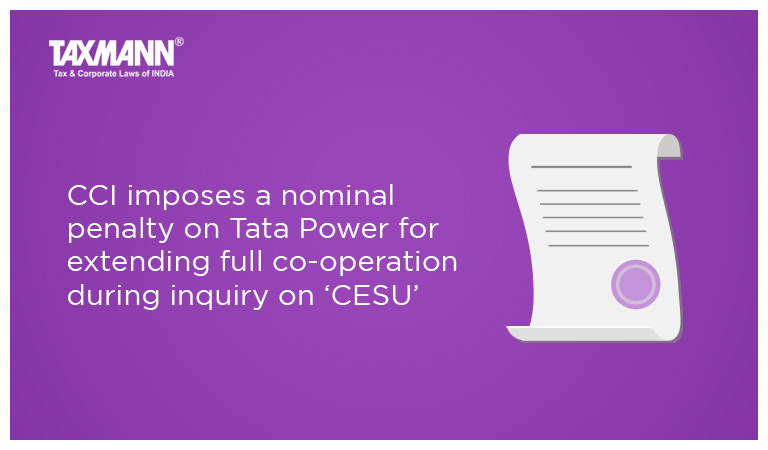CCI imposes a nominal penalty on Tata Power for extending full co-operation during inquiry on ‘CESU’
- Blog|News|Competition Law|
- 2 Min Read
- By Taxmann
- |
- Last Updated on 26 July, 2022

Case Details: Tata Power Company Ltd., In re - [2022] 140 taxmann.com 290 (CCI)
Judiciary and Counsel Details
-
- Ashok Kumar Gupta, Chairperson, Ms Sangeeta Verma & Bhagwant Singh Bishnoi, Member
- Sajan Poovayya, Sr. Adv., Ms Raksha Agrawal, Vaibhav Choukse, Ms Aditi Khanna, Advs. & Ashish Kumar for the Appearing Parties.
Facts of the Case
In the instant case, the company- Tata Power Company Limited (‘TPCL’) acquired 51% equity share capital of ‘CESU’ through a competitive bidding process. During assessment of ‘CESU’ Combination, the Commission noted that ‘TPCL’ ought to have given a notice under section 6(2) of the Competition Act, 2002 regarding impugned transaction, however, it didn’t give any notice to the Commission.
Thereafter, a notice under section 43A of the Competition Act, 2002 read with regulation 48 of Competition Commission of India (General) Regulations, 2009 was issued to the ‘TPCL’ to show cause as to why penalty should not be imposed on it.
In response, the ‘TPCL’ submitted that Odisha Electricity Regulatory Commission (OERC) had exclusive jurisdiction to issue appropriate directions if in its opinion, such acquisition/combination would cause an adverse effect on competition in electricity market in India.
Further, when it received a letter from OERC to file a notice with Commission regarding NESCO combination, the ‘TPCL’ voluntarily filed a notice with Commission in relation to ‘CESU’ combination as well, even though no such direction was issued by OERC in respect of ‘CESU’ Combination.
Furthermore, there was immense pressure from OERC to close the respective transactions as soon as possible, including continuance of the proceedings and the process before OERC even during the COVID-19 pandemic. In view of the foregoing, TPCL prayed that no penalty or only a nominal penalty be levied upon it.
CCI Held
The commission observed that while all the above factors do not absolve TPCL of its obligation to file a notice prior to the consummation of the CESU Combination, they can at best be considered mitigating factors. It was reiterated that, under the mandatory and suspensory regime under the Act, it became incumbent upon the Acquirer to file a notice with the Commission under section 6(2) on acceptance of the LOI for approval of the Commission before consummation of any step of the Combination.
Thus, considering the facts and circumstances of the case and the conduct of TPCL, wherein contravention had been established based on the information voluntarily disclosed by TPCL, who have extended full co-operation in furnishing the information, the Commission decides to take a lenient view and imposes a nominal penalty of Rs. 5 lakhs on TPCL.
List of Cases Referred to
-
- Anand Parkash Agarwal v. Dakshin Haryana Bijli Vitran Nigam Ltd. [2017] 79 taxmann.com 84 (CAT) (para 11)
- Arun Mishra v. State of U.P. [Case No. 43 of 2017, dated 24-1-2018] (para 17)
- HPCL-Mittal Pipelines Ltd. v. Gujarat Energy Transmission Corpn. Ltd. [2018] 91 taxmann.com 4 (CCI) (para 18)
- Neeraj Malhotra v. North Delhi Power Ltd. [Case No. 6 of 2009, dated 11-5-2011] (para 20).
Disclaimer: The content/information published on the website is only for general information of the user and shall not be construed as legal advice. While the Taxmann has exercised reasonable efforts to ensure the veracity of information/content published, Taxmann shall be under no liability in any manner whatsoever for incorrect information, if any.

Taxmann Publications has a dedicated in-house Research & Editorial Team. This team consists of a team of Chartered Accountants, Company Secretaries, and Lawyers. This team works under the guidance and supervision of editor-in-chief Mr Rakesh Bhargava.
The Research and Editorial Team is responsible for developing reliable and accurate content for the readers. The team follows the six-sigma approach to achieve the benchmark of zero error in its publications and research platforms. The team ensures that the following publication guidelines are thoroughly followed while developing the content:
- The statutory material is obtained only from the authorized and reliable sources
- All the latest developments in the judicial and legislative fields are covered
- Prepare the analytical write-ups on current, controversial, and important issues to help the readers to understand the concept and its implications
- Every content published by Taxmann is complete, accurate and lucid
- All evidence-based statements are supported with proper reference to Section, Circular No., Notification No. or citations
- The golden rules of grammar, style and consistency are thoroughly followed
- Font and size that’s easy to read and remain consistent across all imprint and digital publications are applied



 CA | CS | CMA
CA | CS | CMA
